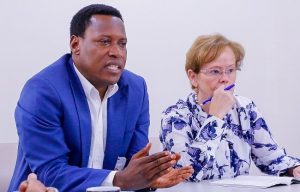Executive Director, The Kukah Centre (TKC), Rev. Fr. Atta Barkindo, has urged governments at all levels to increase their commitments to renewable energy in the country.

This, he said, they should do by prioritising investments, offering incentives, and expanding supportive policies for solar and wind projects.
Barkindo stated this on Monday, October 28, 2024, at a Nigerian Multi-faith National Dialogue on Medium and Long-Term Climate Goal, co-organised by The Kukah Centre, Eco Steward, Al-Habibiyya Islamic Society and GreenFaith Africa.
Barkindo said that, for over 60 years, Nigeria had relied on fossil fuels as the cornerstone of its economy.
He said that the wealth derived from oil had shaped the political landscape, funded infrastructure, and fueled Nigeria’s development.
The executive secretary, however, said that the legacy came at a profound cost as land, once abundant and fertile, now bears the scars of exploitation.
According to him, oil spills have poisoned waters, gas flares have darkened the skies, and communities have been torn apart by environmental degradation and economic disparity.
He said that the impacts of the extractive industry were not limited to the physical environment as the country had witnessed the displacement of communities, deepening inequality, and the erosion of livelihoods.
Barkindo said that dependence on fossil fuels had stunted diversification and innovation, adding that the corrupting power of the fossil fuel industry had been witnessed at different levels.
“We urge the Nigerian government to increase its commitment to renewable energy by prioritising investments, offering incentives, and expanding supportive policies for solar and wind projects.
“With decisive action, Nigeria can lead Africa’s clean energy future and foster a more sustainable, equitable, and resilient economy.
“The climate crisis we face is not just an environmental or economic issue; it is a profound moral issue.
“Fossil fuels have driven the global climate into peril, and Nigeria, despite its contributions to the problem, stands vulnerable to the worst impacts-droughts, floods, heat waves, and food insecurity.
“We are here today to raise a unified voice in demanding a just transition from fossil fuels to renewable energy transition that honours both the dignity of the human person and the integrity of creation,” Barkindo said.
The executive secretary called for a national commitment to renewable energy for all Nigerians, just compensation for affected communities as well as financial and policy support for a green economy.
Barkindo called for an inclusive dialogue and participation of all stakeholders and a global solidarity and climate finance.
Also speaking, the Chief Imam of Al-Habibiyya Islamic Society, Sheikh Fuad Adeyemi, tasked religious leaders to join forces with government by educating their followers on environmental protection.
He said that they had always held a unique position of influence in the Nigerian society as they were regarded as trusted voices, often serving as pillars of strength and guidance in our communities.
According to him, this places a profound responsibility upon them to not only raise awareness but to lead the way in advocating for transition to a clean energy future that leaves no one behind.
“Nigeria, like many nations, faces an urgent need to transition from fossil fuels to renewable and sustainable sources of energy.
“Climate change is already impacting our weather patterns, food security and health.
“Prolonged droughts, heat waves and unpredictable rainfall patterns affect our farmers and threaten food supplies and lead to resource conflicts.
“Those who suffer most are often the poorest among us, whose lives depends closely on the land and its stability,” he said.
Also, Ms. Hafisat Mohammed, a climate change activist, said that Nigeria was faced with climate challenges resulting from oil extraction in the Niger Delta and mining in the northern region.
Mohammed said that the environment was given to man in trust and that all stakeholders should ensure sustained awareness on the negative effects of climate change.
By EricJames Ochigbo
